Recent Storm Damage Posts
Winter hasn't left just yet!
3/31/2022 (Permalink)
At this point most New Englanders know how to handle the big winter storms. We rush to the grocery store to get milk and bread because we are all convinced we will be in our house for days on end! The storms that bring feet of snow to our area, no school for days, and state of emergency to keep nonessential personal off the roads. You could lose power, which could cause food spoilage or frozen pipes… and let’s not forget if there is a quick warm up right behind it, you could experience flooding. The nice thing about these larger storms is that they give us time to prepare.
BUT what about the smaller storms? The ones that only bring a coating, inch or two of sleet, snow or ice? The ones that they always say won’t cause much of an impact?
Did you know these smaller, less significant storms can actually cause a greater impact to your home and business? Why? Because we don’t prepare as much. We are told they won’t be as big so we tend not to stress as much and let our guard down. Four wheel drive can plow through anything right… wrong!
So... what can you do?
- Have a list of your vendors and an emergency ready profile (ERP) completed on your business as an additional add to your continuity plan. It saves you time, in the event this “insignificant storms” turns out to be a really big deal.
- Just because there is a storm coming, your business operations cannot come to a halt. Set clear expectations for those in authority as well as non-critical employees in the event an emergency does occur. Is your emergency plan communicated by text, email, or phone call? Is everyone aware of this? It may also be beneficial to subscribe to and send out public transportation updates so no employees are left stranded at your office. Likewise is it acceptable for your employees to arrive late or leave early to ensure their safety?
- With smaller storms we tend to not walk the perimeter of our business to inspect for damage or ice accumulation. By not doing this, it can lead to larger issues down the road or worse, a customer becoming injured. It is always a good practice no matter how large or small the storm might be to inspect your property and document everything. You never know when your insurance may need that information.
In the end, the size of the storm shouldn’t matter. As business owners preparation is key no matter what Mother Nature has up her sleeve. Contact your sales and marketing representative to learn more about the emergency ready profile (ERP) and how it could benefit your business. Call us with more information 978.688.2242
Dress for all Seasons this time of Year!
3/31/2022 (Permalink)
v
Winter time in and around Lawrence, Methuen and Dracut can be very beautiful! It can also bring lots of weather hazards. Dressing in layers and taking steps to each your body properly fuel should ensure you can enjoy all that winter has to offer!
1. Wear layers - Many layers trap more heat in than just a big jacket alone
2. Hat and Gloves - Most of the body's heat loss occurs in these extremities so keep them covered.
3. Stay Dry - Water compounds any cold weather situation and dramatically speeds up heat loss. For example, wet feet loss heat 25 times faster than dry feet.
4. Take a break = take frequent, short breaks in a warm dry shelter to let your body heat up.
5. Feed! - Eating warm, high calorie foods will give your body the energy it needs to create body heat. Pasta, warm sugar water/sports drinks, etc.
Stay Safe and Warm! Keep COVID common sense in mind as well by always washing your hands with soap for 20 seconds!!
Want more helpful tips. Call us at 978.688.2242
Storm Help = SERVPRO
2/25/2022 (Permalink)
Helping over 400 residents, municipal buildings, hospitals, and business, SERVPRO® sent hundreds of crews to help
2011 Hurricane Irene/Tropical Storm Lee
The storms ranged from North Carolina to New England, and the Disaster Recovery Team®. About 1,000 crews took care of these states, helping return everything to normal.
2012 Hurricane Issac
This storm took on about five states and almost 100 franchises responded to help
2012 Hurricane Sandy
Sandy left her damage across 20 states and brought in 300 franchises, with 1000 crews coming across the country to help and sort through the damage.
2013 Alberta, Canada Floods
Over 120,000 residents were affected by these floods, and was the costliest storm to the country.
2013 Colorado Floods
The Disaster Recovery Team® responded to the towns surrounding the Colorado mountain communities to handle the damage from up to 17 inches of rain. 48 Franchises responded with 109 crews to take on the emergency response.
2014 Polar Vortex
39 States and 70% of the SERVPRO® franchises were affected by these lower than normal temperatures causing pipe breaks and more.
SERVPRO of Lawrence is always ready to help, and call in the Disaster Recovery Team® where needed. When you are looking for help, give us a call.
Painting the town GREEN!
7/29/2021 (Permalink)
When speaking to SERVPRO clients, prospects and customers we get this question a lot; "What makes SERVPRO different than the competition?" SERVPRO's Storm Response is one of the biggest ways we separate ourselves.
Under the direction of SERVPRO Commercial Large Loss Division, our elite large-loss specialists are prequalified and strategically positioned throughout the United States to handle any size disaster.
Every large loss is supervised by a commercial operations manager to help ensure seamless communication and timely mitigation.
At SERVPRO, the difference is our ability to dispatch trained production professionals and cut costs through the strategic placement and oversight of temporary labor. Get the professionals, call SERVPRO of Lawrence 978.688.2242.
For more information on how SERVPRO's Storm response can benefit your home or business, visit our website. SERVPROLawrence.com
Call SERVPRO for all your Winter Needs!
2/9/2021 (Permalink)
WATER… that amazing property that can be a liquid, solid or a gas. We need water to wash dishes, do laundry, shower, cook… the list could go on and on. But in the winter when temperatures drop, that liquid can quickly turn to solid ice and cause havoc in our plumbing. Outlined below are the 3 main causes of frozen pipes as well as ways to prevent pipes from freezing when the bitter cold strikes.
The 3 main causes of frozen pipes are:
- Quick drops in temperature
- Poor insulation
- Thermostat too low
Quick drops in temperature
We can’t control Jack Frost but we can take actions to prevent pipes from bursting when he puts us under a cold spell. Did you know a frozen garden hose can actually burst an indoor pipe? When the water in the hose freezes, it expands, increasing pressure throughout the whole plumbing system. Garden hoses should be disconnected, drained, and stored before the first freeze.
Close the interior shut-off valve leading to outside faucets, open and drain the spigot, and install a faucet insulator. Don’t forget, outdoor kitchens need winterizing, too, to prevent damage.
Poor Insulation
Exposed pipes are most susceptible to freezing so be sure to insulate pipes in your attic or crawl space even if you live where freezing is uncommon. Consider installing products made to insulate water pipes like a "pipe sleeve," "heat tape," or similar materials on exposed water pipes. Newspaper can provide some degree of insulation and protection to exposed pipes.
Thermostat too low
Keep the thermostat set to the same temperature both during the day and at night. By momentarily suspending the use of lower nighttime temperatures, you may incur a higher heating bill, but you can prevent a much more costly repair job if pipes freeze and burst.
If you are planning to head south for the winter, make sure the furnace is set to no lower than 55 degrees. Shut off the main water supply and drain the system by opening all faucets and flushing the toilets. In extreme situations (a vacation home in a bitterly cold climate), you may want to have a plumber come to inspect the system.
If you find yourself in the middle of disaster, our trained, certified professionals are just a phone call away. We are available 24/7/365 and we work with your insurance company to manage the process and paperwork. SERVPRO of Lawrence would love the opportunity to work with you to make it “Like it never even happened.”
Winter has just Arrived!
2/8/2021 (Permalink)
Although this cold season has felt mild for many of us in the northeast, winter isn't over yet! February has brought some big storms our way in the past so please stay prepared! When the snow flies, please follow these helpful tips to stay safe:
- If you have to travel, please be careful when out and about as the roads may be slippery.
- Leave the plows extra room to help take care of our roads.
- Keep a few extra car lengths between you and other travelers just in case anyone needs to stop quickly
- Keep your gas tank at least 1/2 full to avoid freezing lines
- Accelerate slowly to maintain traction on the roads
- Take your time slowing down as sudden braking can cause slipping on ice.
- AAA shares this tip: Don’t stop going up a hill. Get some inertia going on a flat roadway before you take on the hill.
And as always, thank you to all of our emergency responders and utility workers who have to respond.
Please stay safe if you have to travel and as always, if you can, stay home.
For more on the local weather in and around Lawrence and Methuen.
Storm Health and Safety Tips
2/3/2021 (Permalink)
Winter time in and around Lawrence, Methuen and Dracut can be very beautiful! It can also bring lots of weather hazards. Dressing in layers and taking steps to each your body properly fuel should ensure you can enjoy all that winter has to offer!
1. Wear layers - Many layers trap more heat in than just a big jacket alone
2. Hat and Gloves - Most of the body's heat loss occurs in these extremities so keep them covered.
3. Stay Dry - Water compounds any cold weather situation and dramatically speeds up heat loss. For example, wet feet loss heat 25 times faster than dry feet.
4. Take a break = take frequent, short breaks in a warm dry shelter to let your body heat up.
5. Feed! - Eating warm, high calorie foods will give your body the energy it needs to create body heat. Pasta, warm sugar water/sports drinks, etc.
Stay Safe and Warm! Keep COVID common sense in mind as well by always washing your hands with soap for 20 seconds!!
Want more helpful tips. Call us at 978.688.2242
Be Prepped before the Storm
2/3/2021 (Permalink)
At this point most New Englanders know how to handle the big winter storms. We rush to the grocery store to get milk and bread because we are all convinced we will be in our house for days on end! The storms that bring feet of snow to our area, no school for days, and state of emergency to keep nonessential personal off the roads. You could lose power, which could cause food spoilage or frozen pipes… and let’s not forget if there is a quick warm up right behind it, you could experience flooding. The nice thing about these larger storms is that they give us time to prepare.
BUT what about the smaller storms? The ones that only bring a coating, inch or two of sleet, snow or ice? The ones that they always say won’t cause much of an impact?
Did you know these smaller, less significant storms can actually cause a greater impact to your home and business? Why? Because we don’t prepare as much. We are told they won’t be as big so we tend not to stress as much and let our guard down. Four wheel drive can plow through anything right… wrong!
So... what can you do?
- Have a list of your vendors and an emergency ready profile (ERP) completed on your business as an additional add to your continuity plan. It saves you time, in the event this “insignificant storms” turns out to be a really big deal.
- Just because there is a storm coming, your business operations cannot come to a halt. Set clear expectations for those in authority as well as non-critical employees in the event an emergency does occur. Is your emergency plan communicated by text, email, or phone call? Is everyone aware of this? It may also be beneficial to subscribe to and send out public transportation updates so no employees are left stranded at your office. Likewise is it acceptable for your employees to arrive late or leave early to ensure their safety?
- With smaller storms we tend to not walk the perimeter of our business to inspect for damage or ice accumulation. By not doing this, it can lead to larger issues down the road or worse, a customer becoming injured. It is always a good practice no matter how large or small the storm might be to inspect your property and document everything. You never know when your insurance may need that information.
In the end, the size of the storm shouldn’t matter. As business owners preparation is key no matter what Mother Nature has up her sleeve. Contact your sales and marketing representative to learn more about the emergency ready profile (ERP) and how it could benefit your business. Call us with more information 978.688.2242
Severe Storm - What you need to know.
2/3/2021 (Permalink)
Severe weather can happen at anytime, anywhere. Each year, people in the US deal with many different types of intense storms. Here are the averages:
10,000 severe thunderstorms
5,000 floods or flash floods
1,300 tornadoes
2 landfalling deadly hurricanes
About 98% of all government declared disasters as weather related, leading to around 650 deaths per years and nearly $15 billion in damages according to noaa.gov. Knowing your risk of severe weather, taking action and being an example are just a few steps you can take to be better prepared to save your life and assist in saving the lives of others.
What is the difference between WATCH vs. WARNING?
Watch: Conditions are favorable for severe weather. Remain alert for further warnings.
Warning: Severe weather has been spotted or indicted by radar. Take cover immediately.
The Right Roof can be your best Defense against Storm Damage
6/11/2020 (Permalink)
The right roof for your home in and around Dracut, MA can not only look good, but always can protect your home during a storm. Here, we share a blog from Budget Dumpster on how to pick the right roof for you.
"Types of Roof Shingles
Asphalt
Of all the different types of shingles, these are the most commonly used because they’re the least expensive and relatively easy to install. These shingles are made of fiberglass mats coated with asphalt containing sand-like granules.
The downside: Asphalt shingles have a relatively short life span of 20 to 30 years, and they don’t fare well in areas where the temperature fluctuates unexpectedly, such as the Midwest.
Why choose asphalt roofing shingles? They’re the most economical of roofing options and come in plenty of styles and color selections.
Metal
This type of roof is made with many different materials – aluminum, steel, copper, zinc and titanium. If properly maintained, your metal roof could last as long as 50 years. You may want to consider metal if your home’s roofline is flat or steep.
The downside: Metal roofing can become noisy whenever it’s hailing or raining.
Why choose metal roofing shingles? They’re durable, fireproof and good at shedding snow and ice.
Slate
Not only are slate shingles durable – lasting anywhere from 80 to 100 years – they are also highly resistant to water and physical damage.
The downside: In addition to their high price tag, slate is expensive to repair because very few roofing companies specialize in this particular type of shingle. Furthermore, slate is rather heavy and may not be a good fit if your home can’t handle the weight.
Why choose slate roofing shingles? They’re one of the longest-lasting types of roofing material you can choose, and on the right style of home, adds a nice visual appeal.
Wood
Aside from being durable and having a lifespan of 30 to 50 years, wood shingles are more environmentally friendly than other types. This type of roof shingle is usually made of cedar, but can also be made of other rot-resistant woods, such as redwood.
The downside: Although energy-efficient and long-lasting, wood shingles are less fire-resistant than other types. They’re also more susceptible to termites and mold.
Why choose wood roofing shingles? They’re visually appealing and generally cooler than other types of shingles that are darker in color."
For more information on your roof or Budget Dumpster, please visit their blog.
If your roof doesn't hold up in a storm and you are a victim of water damage, please call us at 978.688.2242, to make it "Like it never even happened."
When Something Big Hits, SERVPRO Bands Together
6/10/2020 (Permalink)
When speaking to SERVPRO clients, prospects and customers we get this question a lot; "What makes SERVPRO different than the competition?" SERVPRO's Storm Response is one of the biggest ways we separate ourselves.
Under the direction of SERVPRO Commercial Large Loss Division, our elite large-loss specialists are prequalified and strategically positioned throughout the United States to handle any size disaster.
Every large loss is supervised by a commercial operations manager to help ensure seamless communication and timely mitigation.
At SERVPRO, the difference is our ability to dispatch trained production professionals and cut costs through the strategic placement and oversight of temporary labor. Get the professionals, call SERVPRO of Lawrence 978.688.2242.
For more information on how SERVPRO's Storm response can benefit your home or business, visit our website. SERVPROLawrence.com
Severe Weather Safety
2/8/2020 (Permalink)
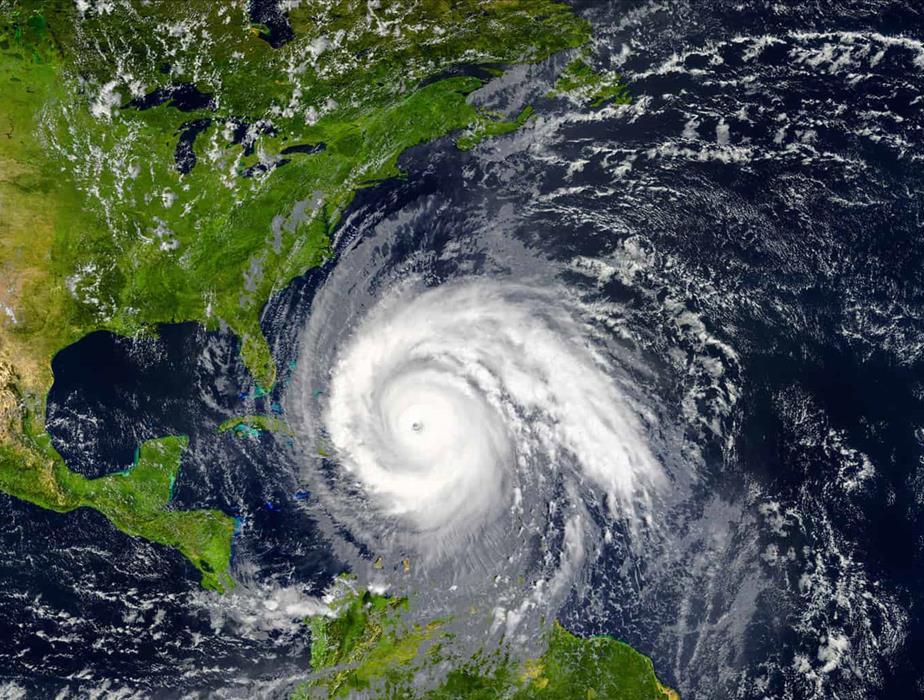 Know how to handle severe weather to protect!
Know how to handle severe weather to protect!
Severe weather can happen at anytime, anywhere. Each year, people in the US deal with many different types of intense storms. Here are the averages:
10,000 severe thunderstorms
5,000 floods or flash floods
1,300 tornadoes
2 landfalling deadly hurricanes
About 98% of all government declared disasters as weather related, leading to around 650 deaths per years and nearly $15 billion in damages according to noaa.gov. Knowing your risk of severe weather, taking action and being an example are just a few steps you can take to be better prepared to save your life and assist in saving the lives of others.
What is the difference between WATCH vs. WARNING?
Watch: Conditions are favorable for severe weather. Remain alert for further warnings.
Warning: Severe weather has been spotted or indicted by radar. Take cover immediately.
Winter isn't over yet!
2/3/2020 (Permalink)
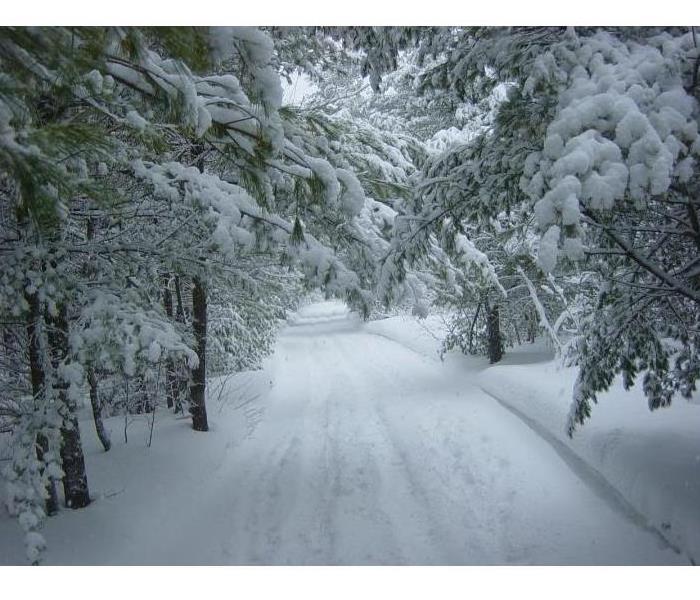 Snow can be beautiful but also can cause safety hazards - BE SAFE!
Snow can be beautiful but also can cause safety hazards - BE SAFE!
Although this cold season has felt mild for many of us in the northeast, winter isn't over yet! February has brought some big storms our way in the past so please stay prepared! When the snow flies, please follow these helpful tips to stay safe:
- If you have to travel, please be careful when out and about as the roads may be slippery.
- Leave the plows extra room to help take care of our roads.
- Keep a few extra car lengths between you and other travelers just in case anyone needs to stop quickly
- Keep your gas tank at least 1/2 full to avoid freezing lines
- Accelerate slowly to maintain traction on the roads
- Take your time slowing down as sudden braking can cause slipping on ice.
- AAA shares this tip: Don’t stop going up a hill. Get some inertia going on a flat roadway before you take on the hill.
And as always, thank you to all of our emergency responders and utility workers who have to respond.
Please stay safe if you have to travel and as always, if you can, stay home.
For more on the local weather in and around Lawrence and Methuen.
Cold Weather Safety Tips
2/3/2020 (Permalink)
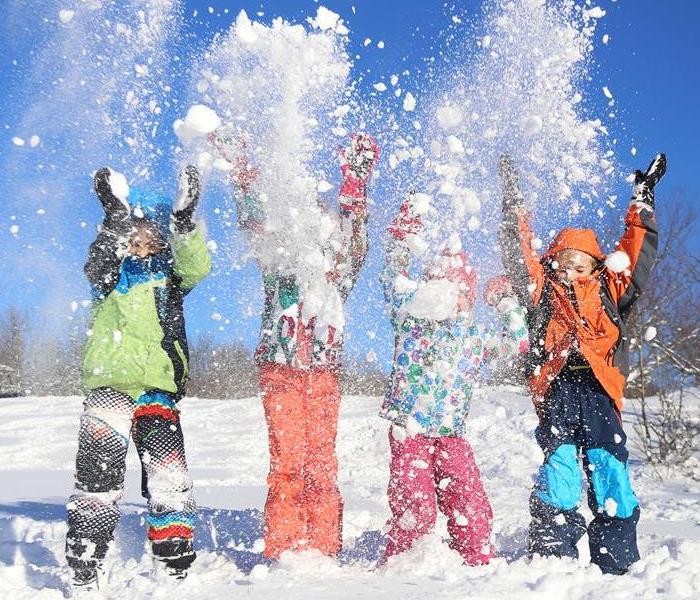 Taking the proper steps will ensure you will have a great time this winter!
Taking the proper steps will ensure you will have a great time this winter!
Winter time in and around Lawrence, Methuen and Dracut can be very beautiful! It can also bring lots of weather hazards. Dressing in layers and taking steps to each your body properly fuel should ensure you can enjoy all that winter has to offer!
1. Wear layers - Many layers trap more heat in than just a big jacket alone
2. Hat and Gloves - Most of the body's heat loss occurs in these extremities so keep them covered.
3. Stay Dry - Water compounds any cold weather situation and dramatically speeds up heat loss. For example, wet feet loss heat 25 times faster than dry feet.
4. Take a break = take frequent, short breaks in a warm dry shelter to let your body heat up.
5. Feed! - Eating warm, high calorie foods will give your body the energy it needs to create body heat. Pasta, warm sugar water/sports drinks, etc.
Stay Safe and Warm!
Avoid Winter Blues
1/27/2020 (Permalink)
WATER… that amazing property that can be a liquid, solid or a gas. We need water to wash dishes, do laundry, shower, cook… the list could go on and on. But in the winter when temperatures drop, that liquid can quickly turn to solid ice and cause havoc in our plumbing. Outlined below are the 3 main causes of frozen pipes as well as ways to prevent pipes from freezing when the bitter cold strikes.
The 3 main causes of frozen pipes are:
- Quick drops in temperature
- Poor insulation
- Thermostat too low
Quick drops in temperature
We can’t control Jack Frost but we can take actions to prevent pipes from bursting when he puts us under a cold spell. Did you know a frozen garden hose can actually burst an indoor pipe? When the water in the hose freezes, it expands, increasing pressure throughout the whole plumbing system. Garden hoses should be disconnected, drained, and stored before the first freeze.
Close the interior shut-off valve leading to outside faucets, open and drain the spigot, and install a faucet insulator. Don’t forget, outdoor kitchens need winterizing, too, to prevent damage.
Poor Insulation
Exposed pipes are most susceptible to freezing so be sure to insulate pipes in your attic or crawl space even if you live where freezing is uncommon. Consider installing products made to insulate water pipes like a "pipe sleeve," "heat tape," or similar materials on exposed water pipes. Newspaper can provide some degree of insulation and protection to exposed pipes.
Thermostat too low
Keep the thermostat set to the same temperature both during the day and at night. By momentarily suspending the use of lower nighttime temperatures, you may incur a higher heating bill, but you can prevent a much more costly repair job if pipes freeze and burst.
If you are planning to head south for the winter, make sure the furnace is set to no lower than 55 degrees. Shut off the main water supply and drain the system by opening all faucets and flushing the toilets. In extreme situations (a vacation home in a bitterly cold climate), you may want to have a plumber come to inspect the system.
If you find yourself in the middle of disaster, our trained, certified professionals are just a phone call away. We are available 24/7/365 and we work with your insurance company to manage the process and paperwork. SERVPRO of Lawrence would love the opportunity to work with you to make it “Like it never even happened.”
Preparing for the Worst!
9/4/2019 (Permalink)
 By beginning the process of learning about specific threats relative to where you work or live, you are preparing yourself to react in an emergency.
By beginning the process of learning about specific threats relative to where you work or live, you are preparing yourself to react in an emergency.
You never know when a storm will hit your community, how bad it will be or what damage it will cause. But the liklihood of surviving goes up when you are prepared.
This National Preparedness Month, we are focusing on putting the tools in place to make it on our own, at least for a period of time, no matter where we are when a disaster strikes. Just like having a working smoke detector, preparing for the unexpected makes sense.
Ways You Can Prepare now!
Organize a kit of emergency supplies.
- Use what you have on hand to for you and your family to make it for at least three days with possibly no help.
- Focus on food, clean air, and water as your priorities. In a state of emergency, comfort may not be at the top of mind, but instead survival after a fire, flood, hurricane, or even an ice storm.
- A gallon of water a day per person in your family is a great guideline as to how much to store.
- Also include a three-day supply of non-perishable foods that are easy to store and prepare, such as protein bars, dried fruit, or canned foods.
- Sleeping bags, sweatshirts, jackets, hats and gloves are great for the winter months
- Pack something to cover your mouth and nose, such as two to three layers of a cotton t-shirt, handkerchief or towel, or a filtered mask.
- It is also recommended you include duct tape and heavyweight garbage bags in your emergency kit that can be used to seal windows and doors to create a barrier between yourself and any contamination on the other side.
- Make a plan for what you will do in an emergency situation. Make sure everyone in your family is aware of what the plan is.
Using these steps as a start to prepare for emergencies, you and your family will know what to do in case the unexpected happens. For more information, check with your local government offices as to their plans and how you can work off of those.
Storm Safety during National Preparedness Month
9/3/2019 (Permalink)
As a property owner, if storms are on the horizon, you start looking for ways to protect your home and family.
Join your community for National Preparedness Month in their ideas and events to prepare for emergencies and disasters of all types, and leading efforts to encourage the community as a whole to become more prepared. “Disasters happen” and not only devastate individuals and neighborhoods, but entire communities, including businesses of all sizes.
If you own a business in the local community, having a business continuity plan can help protect your company, its employees and its infrastructure, and maximizes your chances of recovery after an emergency or disaster. You can do this by taking three simple steps:
- Plan to stay in business
- Encourage your employees to become ready
- Protect your investment
Working with your local government, other businesses, and the community, we choose to work together as a team to ensure that our families, businesses, places of worship and neighborhoods are ready.
Look to Ready.gov/business to find vital information on how to begin preparing for and addressing the unique needs during an emergency. You can also contact SERVPRO® of Lawrence to find out more on how to be ready when disaster strikes!
What about those smaller storms?
2/1/2019 (Permalink)
 Did you know these smaller, less significant storms can actually cause a greater impact to your home and business?
Did you know these smaller, less significant storms can actually cause a greater impact to your home and business?
We all know how to handle those big winter storms. You know the ones the news predicts a week out that has you rushing to the grocery store to get milk and bread because we are all convinced we will be in our house for days. The storms that bring feet of snow to our area, no school for days, and state of emergency to keep nonessential personal off the roads. You could lose power, which could cause food spoilage or frozen pipes… and let’s not forget if there is a quick warm up right behind it, you could experience flooding. The nice thing about these larger storms is that they give us time to prepare.
BUT what about the smaller storms? The ones that only bring a coating, inch or two of sleet, snow or ice? The ones that they always say won’t cause much of an impact?
Did you know these smaller, less significant storms can actually cause a greater impact to your home and business? Why? Because we don’t prepare as much. We are told they won’t be as big so we tend not to stress as much and let our guard down.
So... what can you do?
- Have a list of your vendors and an emergency ready profile (ERP) completed on your business as an additional add to your continuity plan. It saves you time, in the event this “insignificant storms” turns out to be a really big deal.
- Just because there is a storm coming, your business operations cannot come to a halt. Set clear expectations for those in authority as well as non-critical employees in the event an emergency does occur. Is your emergency plan communicated by text, email, or phone call? Is everyone aware of this? It may also be beneficial to subscribe to and send out public transportation updates so no employees are left stranded at your office. Likewise is it acceptable for your employees to arrive late or leave early to ensure their safety?
- With smaller storms we tend to not walk the perimeter of our business to inspect for damage or ice accumulation. By not doing this, it can lead to larger issues down the road or worse, a customer becoming injured. It is always a good practice no matter how large or small the storm might be to inspect your property and document everything. You never know when your insurance may need that information.
In the end, the size of the storm shouldn’t matter. As business owners preparation is key no matter what Mother Nature has up her sleeve. Contact your sales and marketing representative to learn more about the emergency ready profile (ERP) and how it could benefit your business.
Stay Safe When the Snow Flies
2/1/2019 (Permalink)
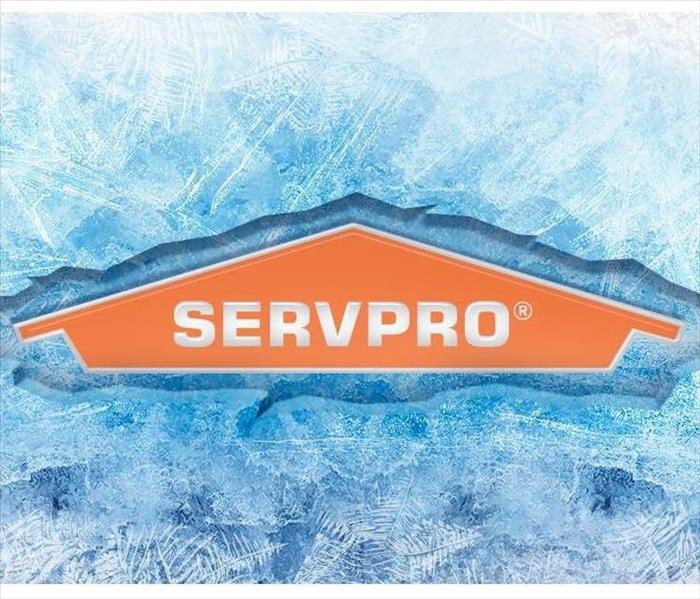 There is still some winter left for us all! Stay safe when the cold weather and snow hit!
There is still some winter left for us all! Stay safe when the cold weather and snow hit!
Winter isn't over, so when the snow flies, please follow these helpful tips to stay safe:
- If you have to travel, please be careful when out and about as the roads may be slippery.
- Leave the plows extra room to help take care of our roads.
- Keep a few extra car lengths between you and other travelers just in case anyone needs to stop quickly
- Keep your gas tank at least 1/2 full to avoid freezing lines
- Accelerate slowly to maintain traction on the roads
- Take your time slowing down as sudden braking can cause slipping on ice.
- AAA shares this tip: Don’t stop going up a hill. Get some inertia going on a flat roadway before you take on the hill.
And as always, thank you to all of our emergency responders and utility workers who have to respond.
Please stay safe if you have to travel and as always, if you can, stay home.
For more on the weather
We Have "The Right Stuff"!
2/1/2019 (Permalink)
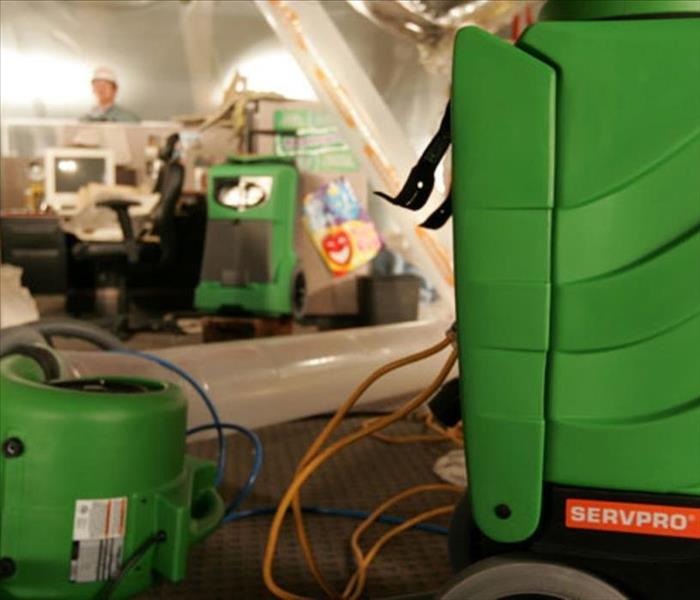 The proper equipment makes a measurable difference in reducing the damage expense during a fire or water loss.
The proper equipment makes a measurable difference in reducing the damage expense during a fire or water loss.
Any type of water damage has the potential to cause serious structural and indoor air quality problems if not properly taken care of.
The key to avoiding costly future restoration is to handle every water problem as a real threat to your property. SERVPRO® of Lawrence has the equipment, training and experience to find and dry unseen water before secondary damages occur. SERVPRO® of Lawrence will answer your call with fast action and a full arsenal of drying equipment. Here are a few of the tools used by your local SERVPRO® Franchise Professionals.
- Moisture Sensors are used to detect moisture in carpets, baseboards and Moisture Meters (pictured) are used to determine the actual moisture content of various materials. The moisture tester provides accurate readings, allowing SERVPRO® Franchise Professionals to monitor the drying process.
- Thermohygrometers measure temperature and relative humidity. When armed with this information, SERVPRO® of Lawrence can calculate and create an environment most conclusive to drying.
- Ultra-Low-Volume (ULV) Foggers will atomize liquid deodorizing agents, producing a fine mist that can easily penetrate the site where odor-causing residues may accumulate. This device can also be used to inject fungicides and disinfectants into wall cavities and other hard-to-reach
Want some more information from SERVPRO® of Lawrence? Watch this video to learn more about our air movers and how they benefit the damage in your home. Our call us at 978-688-2242 to learn more about our training and equipment to help make it "Like it never even happened."
Tips to help prevent pipes from freezing this winter
1/3/2019 (Permalink)
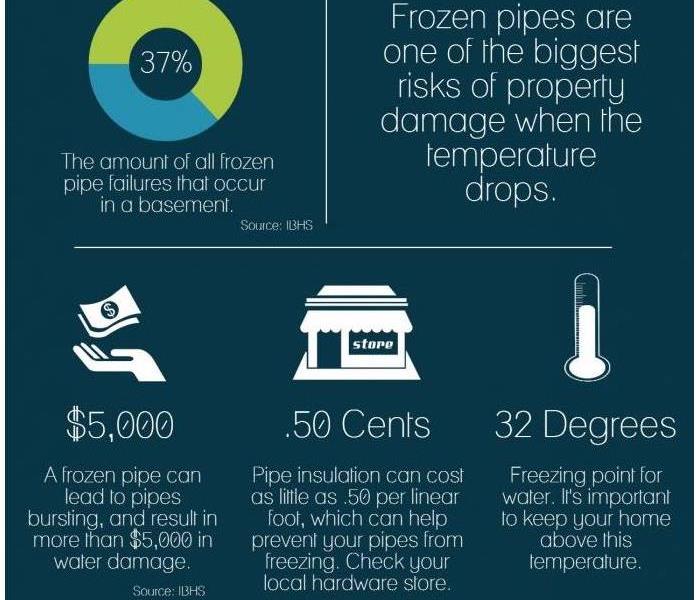 In the winter when temperatures drop, that liquid can quickly turn to solid ice and cause havoc in our lives.
In the winter when temperatures drop, that liquid can quickly turn to solid ice and cause havoc in our lives.
WATER… that amazing property that can be a liquid, solid or a gas. We need water to wash dishes, do laundry, shower, cook… the list could go on and on. But in the winter when temperatures drop, that liquid can quickly turn to solid ice and cause havoc in our lives. Outlined below are the 3 main causes of frozen pipes as well as ways to prevent pipes from freezing when the bitter cold strikes.
The 3 main causes of frozen pipes are:
- Quick drops in temperature
- Poor insulation
- Thermostat too low
Quick drops in temperature
We can’t control Mother Nature but we can take measures to prevent pipes from bursting when she puts us under a cold spell. Did you know a frozen garden hose can actually burst an indoor pipe? When the water in the hose freezes, it expands, increasing pressure throughout the whole plumbing system. Garden hoses should be disconnected, drained, and stored before the first hard freeze.
Close the interior shut-off valve leading to outside faucets, open and drain the spigot, and install a faucet insulator. Don’t forget, outdoor kitchens need winterizing, too, to prevent damage.
Poor Insulation
Exposed pipes are most susceptible to freezing so be sure to insulate pipes in your attic or crawl space even if you live where freezing is uncommon. Consider installing products made to insulate water pipes like a "pipe sleeve," "heat tape," or similar materials on exposed water pipes. Newspaper can provide some degree of insulation and protection to exposed pipes.
Thermostat too low
Keep the thermostat set to the same temperature both during the day and at night. By temporarily suspending the use of lower nighttime temperatures, you may incur a higher heating bill, but you can prevent a much more costly repair job if pipes freeze and burst.
If you are planning to head south for the winter, make sure the furnace is set to no lower than 55 degrees. Shut off the main water supply and drain the system by opening all faucets and flushing the toilets. In extreme situations (a vacation home in a bitterly cold climate), you may want to have a plumber come to inspect the system.
If you find yourself in the middle of disaster, our trained, certified professionals are just a phone call away. We are available 24/7/365 and we work with your insurance company to manage the process and paperwork. SERVPRO of Lawrence would love the opportunity to work with you to make it “Like it never even happened.”
National Preparedness Month
8/28/2018 (Permalink)
As a business owner, insurer or property manager, you are a leader in your community and have the opportunity to set an example for your employees, customers and community to follow.
This year for National Preparedness Month, join your community in preparing for emergencies and disasters of all types, and leading efforts to encourage the community as a whole to become more prepared. “Disasters happen” and not only devastate individuals and neighborhoods, but entire communities, including businesses of all sizes.
As an employer in your community, having a business continuity plan can help protect your company, its employees and its infrastructure, and maximizes your chances of recovery after an emergency or disaster. You can do this by taking three simple steps:
- Plan to stay in business
- Encourage your employees to become ready
- Protect your investment
We must work together as a team to ensure that our families, businesses, places of worship and neighborhoods are ready. At Ready.gov/business, companies can find vital information on how to begin preparing their organization and addressing their unique needs during an emergency. You can also contact your SERVPRO® of Lawrence Professional to find out more on how to be ready when disaster strikes with the Emergency READY Program®.
If a Disaster Strikes, Will You Be Ready?
8/28/2018 (Permalink)
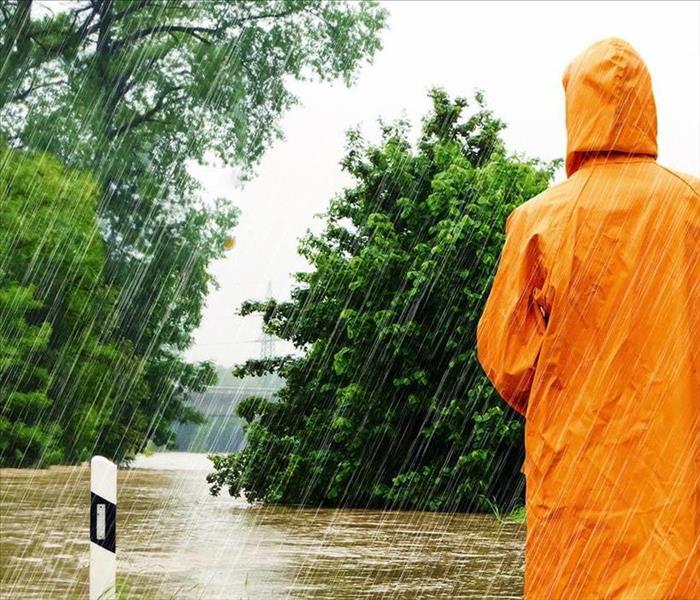 It is important to prepare before a disaster occurs.
It is important to prepare before a disaster occurs.
In times of hurricanes, gas explosions, and floodings, it is important to always be prepared. Consider the following steps to help you better prepare for an emergency situation.
- Sign up for local alerts and warnings, download apps and/ or check access for wireless emergency alerts.
- Develop and test emergency communication plans.
- Assemble or update emergency supplies.
- Learn about local hazards and conduct a drill to practice emergency response actions.
- Participate in a preparedness discussion, training or class.
- Collect and safeguard critical documents.
- Plan with neighbors to help each other and share resources.
- Document property and obtain appropriate insurance for relevant hazards.
- Make property improvements to reduce potential injury and property damage.
Emergencies can happen anytime to anyone. Take action now to protect yourself and your property.
Snow Safety Tips
1/16/2018 (Permalink)
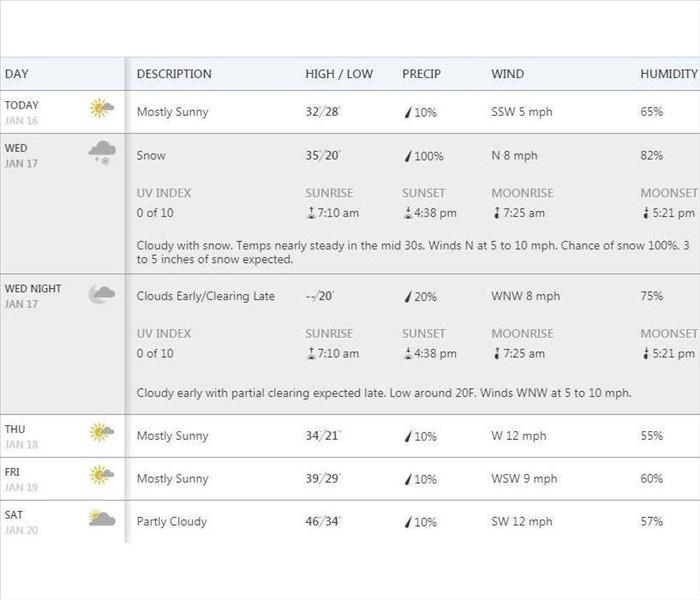 The normal dry pavement following distance of three to four seconds should be increased to eight to ten seconds.
The normal dry pavement following distance of three to four seconds should be increased to eight to ten seconds.
There is more snow coming our way! Please follow these helpful tips to stay safe:
- If you have to travel, please be careful when out and about as the roads may be slippery.
- Leave the plows extra room to help take care of our roads.
- Keep a few extra car lengths between you and other travelers just in case anyone needs to stop quickly
- Keep your gas tank at least 1/2 full to avoid freezing lines
- Accelerate slowly to maintain traction on the roads
- Take your time slowing down as sudden braking can cause slipping on ice.
- AAA shares this tip: Don’t stop going up a hill. Get some inertia going on a flat roadway before you take on the hill.
And as always, thank you to all of our emergency responders and utility workers who have to respond.
Please stay safe if you have to travel and as always, if you can, stay home.
For more on the weather: http://ow.ly/pwdf30hO0DR
The Best Equipment for Your Water Damage
1/12/2018 (Permalink)
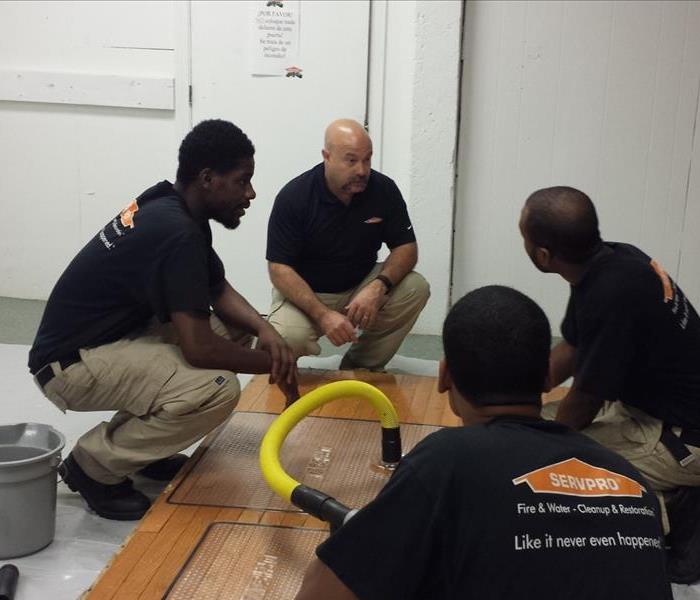 Pictured here are floor drying mats. We are constantly training our crews to use the best solutions in resolving your water damage.
Pictured here are floor drying mats. We are constantly training our crews to use the best solutions in resolving your water damage.
Any type of water damage has the potential to cause serious structural and indoor air quality problems if not properly taken care of.
The key to avoiding costly future restoration is to handle every water problem as a real threat to your property. SERVPRO® of Lawrence has the equipment, training and experience to find and dry unseen water before secondary damages occur. The proper equipment makes a measurable difference in reducing the damage expense during a fire or water loss. SERVPRO® of Lawrence will answer your call with fast action and a full arsenal of drying equipment. Here are a few of the tools used by your local SERVPRO® Franchise Professionals.
- Moisture Sensors are used to detect moisture in carpets, baseboards and Moisture Meters (pictured) are used to determine the actual moisture content of various materials. The moisture tester provides accurate readings, allowing SERVPRO® Franchise Professionals to monitor the drying process.
- Thermohygrometers measure temperature and relative humidity. When armed with this information, SERVPRO® of Lawrence can calculate and create an environment most conclusive to drying.
- Ultra-Low-Volume (ULV) Foggers will atomize liquid deodorizing agents, producing a fine mist that can easily penetrate the site where odor-causing residues may accumulate. This device can also be used to inject fungicides and disinfectants into wall cavities and other hard-to-reach
SERVPRO® of Lawrence (978-688-2242) has the training and equipment to help make it "Like it never even happened."
Warming Temperatures, Melting Snow, and Rain....Oh MY!
1/11/2018 (Permalink)
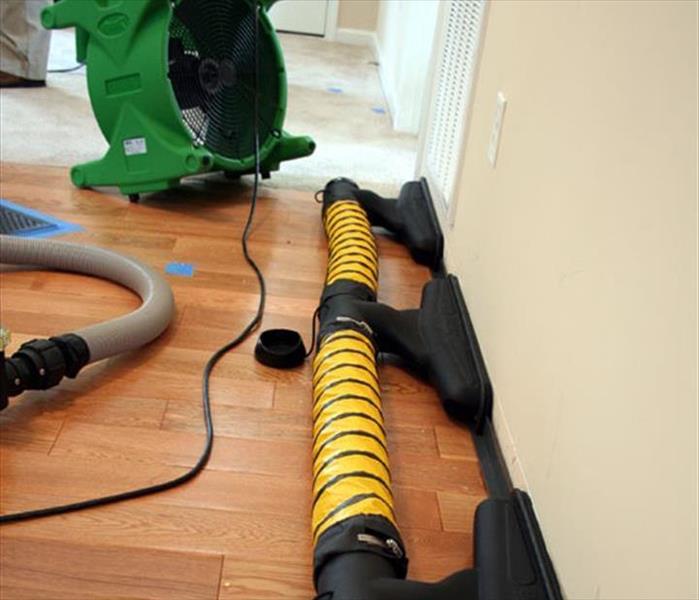 When fire and water take control of your life, SERVPRO® of Lawrence will help you take it back. Give us a call to help today! (978) 688-2242
When fire and water take control of your life, SERVPRO® of Lawrence will help you take it back. Give us a call to help today! (978) 688-2242
With warming temperatures, melting snow, and rain in the forecast, flooding is on the horizon.
Floods rank as one of the most common and widespread natural disasters in the United States. Whether you live near a coastline, along city streets, in the mountains, near a river or even in the desert, there is a potential for suffering from flood damage.
Just because you haven't experienced a flood in the past, doesn’t mean you won't in the future. In fact, 20% of all claims paid by the National Flood Insurance Program (NFIP) were for policies in low-risk communities. On average, floods cost $3 billion in annual losses in the United States. Commercial flood claims average more than $75,000.
According to the American Red Cross (ARC), floods cause more damage in the U.S. every year than any other weather-related disaster. The ARC offers the following flood safety tips.
- Stay away from floodwaters. If you come up on a flowing scream where water is above your ankles, stop, rum around and go another Six inches of swiftly moving water can sweep you off of your feet.
- If you approach a flooded road while driving, turn around and go another way. If you are caught on a flooded road and waters are rising rapidly around you, get out of the car quickly and move to higher ground. Most cars can be swept away by less than two feet of moving water.
- Keep children out of the water. They are curious and often lack judgment about run ning water or contaminated water. Keep your pets out of the water too.
If a flood does strike your home or business, contact SERVPRO® of Lawrence. Even minor floods have the potential to cause major damage to a structure when not treated quickly and properly, and the cleanup is often an overwhelming task. The SERVPRO® System is prepared to handle any sized disaster. The sooner work begins, the sooner order can be restored.
Winter Storm Damage in Your Lawrence Area Home
12/25/2017 (Permalink)
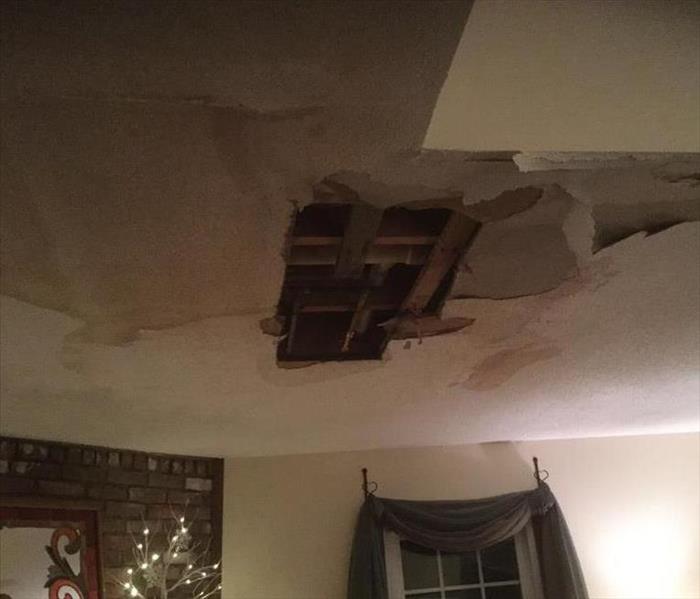 While the weather is in Mother Nature’s control, there are steps that everyone can take in order to protect their property.
While the weather is in Mother Nature’s control, there are steps that everyone can take in order to protect their property.
Winter months are very hazardous to homes and businesses. With rain, snow, below freezing temperatures, and ice there are many different causes of damage. While the weather is in Mother Nature’s control, there are steps that everyone can take in order to protect their property.
- Watch for downed limbs and trees. The weight of ice and snow can cause these to break and fall, causing damage to electrical lines or homes. If it does take down wires, stay away from them and call 911 or your electrical company. Do not touch anything that the wires are on. You never know if they are live.
- Inspect the roof, gutters, and water pipes for damage. Keep them clear of all debris.
- Keep roof lines clear of snow and ice as much as possible to prevent ice dams
- When temperatures dip below freezing, keep faucets dripping in order to prevent frozen pipes that can burst and cause further damage.
- If you own a commercial building, consider asking SERVPRO® of Lawrence to provide and Emergency Ready Profile to help prepare you when an emergency does happen. As this is a free program, there is no better time than now to get this started.
These and many more tips will help keep you safe this winter, and hopefully prevent less damage to your property.
6 Tips to Prepare Your Lawrence, Methuen, or Dracut Home
12/11/2017 (Permalink)
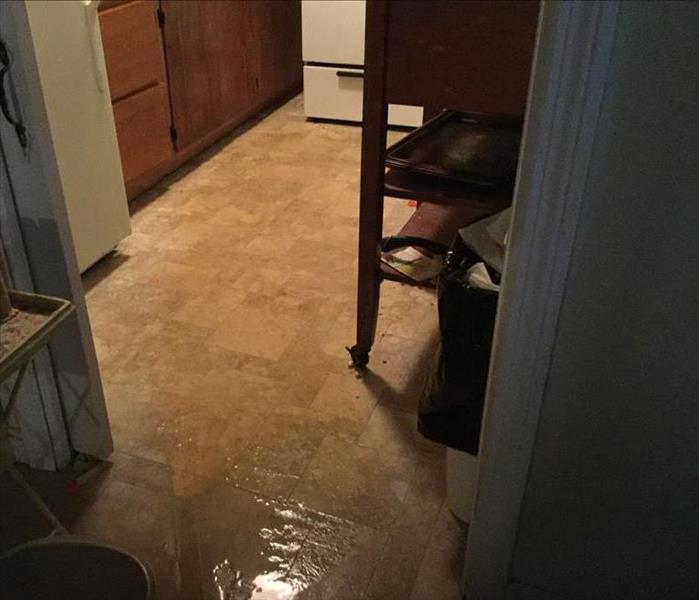 Whether it is heavy rain, freezing temperatures, damaging winds, sleet or snow, all can cause serious property damage.
Whether it is heavy rain, freezing temperatures, damaging winds, sleet or snow, all can cause serious property damage.
Cold weather can have a huge impact on your home or business if you are not properly prepared. Whether it is heavy rain, freezing temperatures, damaging winds, sleet or snow, all can cause serious property damage. While you can't control the weather, you can take steps to be prepared, and help take the sting out of winter weather.
To help prevent costly damages due to weather, consider taking the following precautions before winter weather hits.
- Check your home for downed tree limbs. Weather, such as wind, heavy rain, ice and snow, can cause branches to fall, which could cause damage to the property and potentially cause personal injuries.
- Roofs, water pipes and gutters should all be inspected to ensure they are in proper order. Gutter downspouts should be directed away from your Clear gutters of debris that may have gathered during the fall. Leaves and other obstructions can lead to a damming effect, causing roof damage and interior water problems.
- Inspect property, especially walkways and parking lots, for proper drainage to alleviate flood hazard.
- Inspect all hand rails, stairwells and entryways to address and correct potential slippery or hazardous areas. Install mats or non-slip surfaces and post caution signs where water could be present.
- Protect water pipes from freezing by simply allowing water to drip when temperatures dip below If pipes are under a cabinet, leave the cabinet doors open allowing warm inside air to circulate around the pipes. If the building has outdoor faucets, consider shutting water off at the main valve in the basement or crawl space. Once the valve is off, open the outdoor faucet to ensure it drains, preventing any remaining water from freezing in the pipe
SERVPRO® of Lawrence is here to help you when disaster strikes. We are only a all away, 978-688-2242.
Choosing the Right Roof For Your Home
8/24/2017 (Permalink)
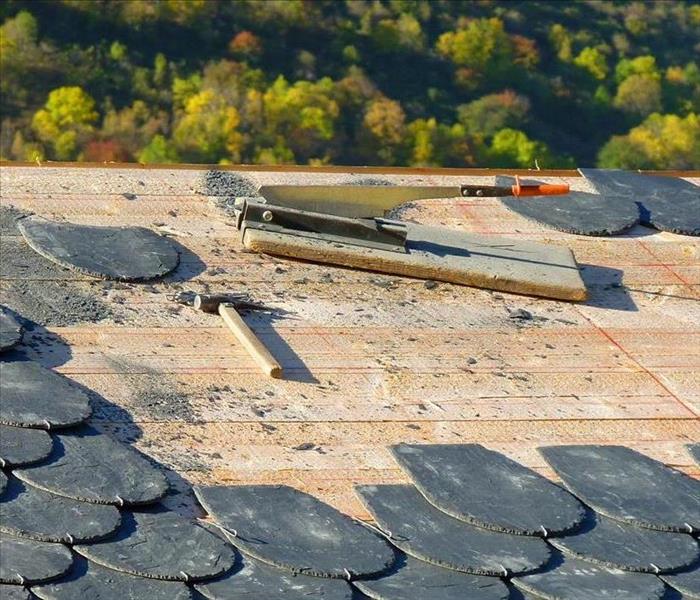 Knowing the damage that can occur in your region will help determine the type of roof that belongs on your home.
Knowing the damage that can occur in your region will help determine the type of roof that belongs on your home.
The right roof for your home can not only look good, but always can protect your home during a storm. Here, we share a blog from Budget Dumpster on how to pick the right roof for you.
"Types of Roof Shingles
Asphalt
Of all the different types of shingles, these are the most commonly used because they’re the least expensive and relatively easy to install. These shingles are made of fiberglass mats coated with asphalt containing sand-like granules.
The downside: Asphalt shingles have a relatively short life span of 20 to 30 years, and they don’t fare well in areas where the temperature fluctuates unexpectedly, such as the Midwest.
Why choose asphalt roofing shingles? They’re the most economical of roofing options and come in plenty of styles and color selections.
Metal
This type of roof is made with many different materials – aluminum, steel, copper, zinc and titanium. If properly maintained, your metal roof could last as long as 50 years. You may want to consider metal if your home’s roofline is flat or steep.
The downside: Metal roofing can become noisy whenever it’s hailing or raining.
Why choose metal roofing shingles? They’re durable, fireproof and good at shedding snow and ice.
Slate
Not only are slate shingles durable – lasting anywhere from 80 to 100 years – they are also highly resistant to water and physical damage.
The downside: In addition to their high price tag, slate is expensive to repair because very few roofing companies specialize in this particular type of shingle. Furthermore, slate is rather heavy and may not be a good fit if your home can’t handle the weight.
Why choose slate roofing shingles? They’re one of the longest-lasting types of roofing material you can choose, and on the right style of home, adds a nice visual appeal.
Wood
Aside from being durable and having a lifespan of 30 to 50 years, wood shingles are more environmentally friendly than other types. This type of roof shingle is usually made of cedar, but can also be made of other rot-resistant woods, such as redwood.
The downside: Although energy-efficient and long-lasting, wood shingles are less fire-resistant than other types. They’re also more susceptible to termites and mold.
Why choose wood roofing shingles? They’re visually appealing and generally cooler than other types of shingles that are darker in color."
For more information on your roof or Budget Dumpster, please visit their blog.
If your roof doesn't hold up in a storm and you are a victim of water damage, please call us at 978-688-2242, to make it "Like it never even happened."
What You Can Do to Help Prevent Damage During a Hurricane!
6/1/2017 (Permalink)
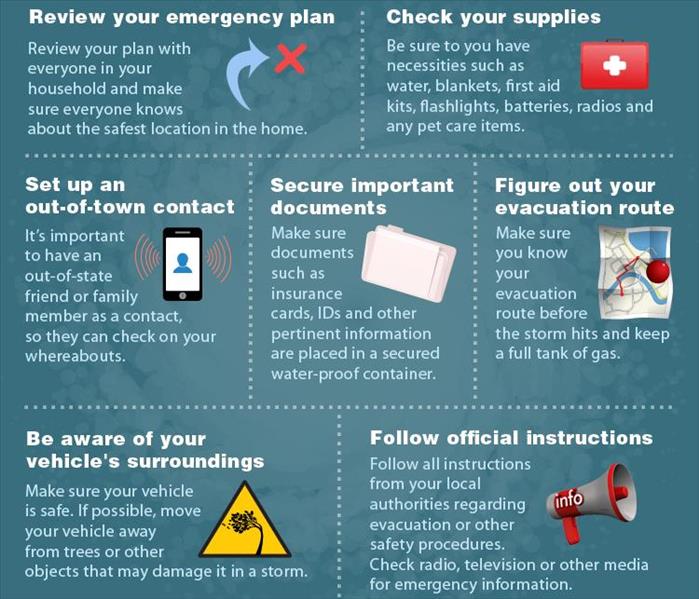 The Atlantic Hurricane season runs from June 1st to November 30th. Make sure you are prepared should one be near you!
The Atlantic Hurricane season runs from June 1st to November 30th. Make sure you are prepared should one be near you!
June is the start of Hurricane Season. Hurricane's are defined as an intense tropical weather system of strong thunderstorms with a well-defined surface circulation and maximum sustained winds of 74 MPH or higher. You can see a storm coming by the change in color of the sky (often greenish), large hail, low-flying clouds and a roar like a freight train.
Below are some helpful hints to follow whether you own a home, RV, boat, car or all of them!
- It is best to have a plan in place regarding where you are going to go when a hurricane hits. While they may be intriguing to watch, the best place is NOT outside. Your basement or under a set of stairs are great places to wait out the storm. If this is not available, the bottom floor of any building will work.
- Keep your car indoors if possible. Tape up the windows and door with tarps and keep away from any objects that could damage the car if they were to fall on top of it.
- During an emergency, gas stations will often be closed, so always make sure you have at least half a tank of gas to get away instantly
- Have enough supplies on hand to wait out 72 hours, just in case help cannot arrive right away. These supplies can also be stored in the trunk (items like a first aid kit, bottled water, non-perishable foods, and medication can stay there at all times.)
- Make sure your car is in proper shape. Have a full tank of gas, wiper blades and tires are ready to go.
- Make sure your cell phone is charged and keep your charger with you.
- Avoid driving in deep waters
- For your boat, remove non-secure items, electronics, excess gear, valuable, and important documents.
- Make sure all openings are clear of debris
- Double all lines that are securing your boat to its securing space
- With your RV, do not drive it during the storm as it is more vulnerable to higher/stronger winds
- Make sure you have a full tank of gas, but empty holding tanks, turn off propane cylinders and cover the regulator.
- Make sure all documents are in a waterproof bag and with you at all times
Life can be unpredictable, but having plans in place help you with whatever may come. For more information, please check out these hurricane tips. As always, once the storm passes, contact your SERVPRO of Lawrence at 978-688-2242 to help make it “Like it never even happened.”
Surprise Snow Storms Tips for Your Methuen Home!
3/7/2017 (Permalink)
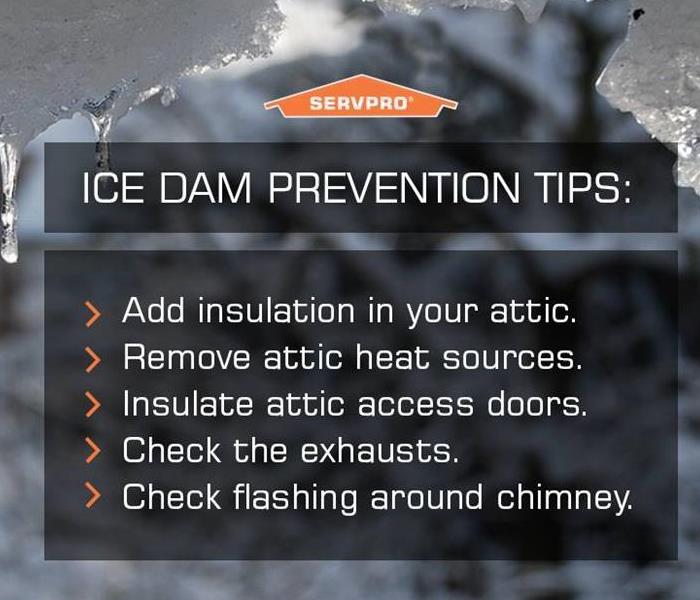 When it comes to life’s emergencies, it isn't a matter of if they will occur, it's a matter of when they will occur.
When it comes to life’s emergencies, it isn't a matter of if they will occur, it's a matter of when they will occur.
The potential for surprise snow storms as Spring approaches can be very real. They can also be beautiful to see as the snow sticks to trees. But they can be dangerous to your home and office. In order to stay safe, SERVPRO of Lawrence wants you to please follow these and other safety tips for your home.
- Before the Storm
- Have an emergency supply kit on hand
- Develop a communication plan with all members of your family
- After the Storm
- If wires come down due to the weight of the snow, do not touch them
- Do not drive on roads that haven't been cleared
Keep you and your family safe through a storm. When in doubt, stay away from anything that may look suspicious or anything that may be break due to the weight of the snow.
If the snow starts melting and it comes into your home, SERVPRO of Lawrence is here to help! We can remove any affected materials and dry out the structure. For more information, please visit our website or call (978) 688-2242
When the Ice Dams Hit Your Home, SERVPRO of Lawrence is Here to Help!
2/20/2017 (Permalink)
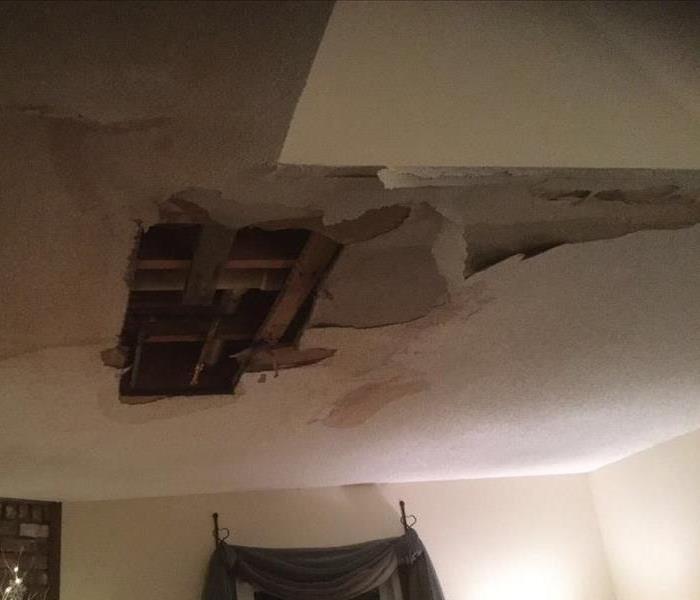 SERVPRO of Lawrence has the specific water damage training and experience to help you through this tough time.
SERVPRO of Lawrence has the specific water damage training and experience to help you through this tough time.
SERVPRO of Lawrence is available 24 hours a day for water emergencies, large or small. When you are dealing with water damage, immediate action is crucial. A delay of just a few hours can greatly increase the severity of the water damage.
We Answer the Phone Ready to Help
Call Today - 978-688-2242
We understand that when you call us, you may be feeling confused, stressed, and vulnerable. You need an expert to guide you through this crisis. SERVPRO of Lawrence has the specific water damage training and experience to help you through this tough time. We specialize in water damage restoration—in fact, it's the cornerstone of our business.
What to Expect
When you call, we will ask several questions regarding your water damage emergency. These questions will help us determine what equipment and resources to bring, including how many trained SERVPRO Professionals may be needed.
Our SERVPRO Representative will ask several questions:
- Your name and contact information
- Your insurance information (if applicable)
- The street address of the water-damaged home or business
- When did the flooding or water damage occur?
- What caused the water damage (if known)?
- Is there electricity available (on-site)?
About SERVPRO of Lawrence
SERVPRO of Lawrence specializes in the cleanup and restoration of residential and commercial property after a fire, smoke or water damage event. Our staff is highly trained in property damage restoration. From initial and ongoing training at SERVPRO’s corporate training facility to regular IICRC-industry certification, rest assured our staff is equipped with the knowledge to restore your property.
Meet our crew http://www.SERVPROlawrence.com/employee-photos
Certifications http://www.SERVPROlawrence.com/restoration-training-certifications
Facts About Flooding in Your Methuen Area
1/10/2017 (Permalink)
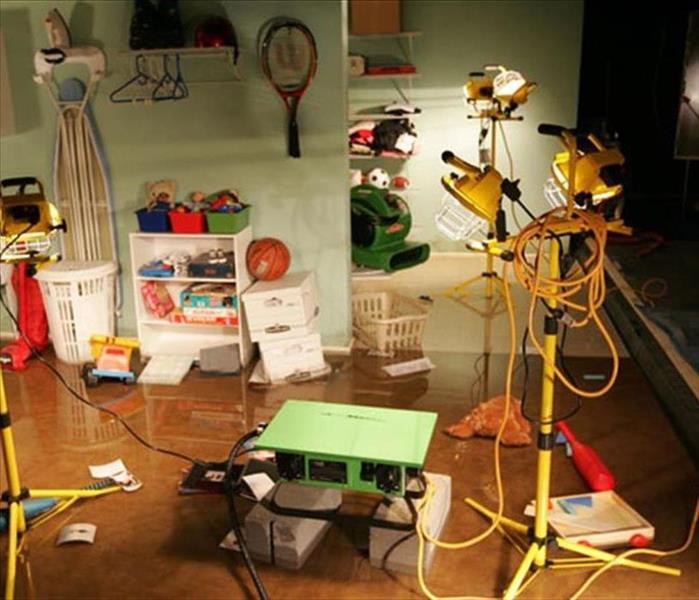 Even minor floods have the potential to cause major damage to a structure when not treated quickly and properly, and the cleanup is often an overwhel
Even minor floods have the potential to cause major damage to a structure when not treated quickly and properly, and the cleanup is often an overwhel
Floods rank as one of the most common and widespread natural disasters in the United States. Whether you live near a coastline, along city streets, in the mountains, near a river or even in the desert, there is a potential for suffering from flood damage.
Just because you haven't experienced a flood in the past, doesn’t mean you won't in the future. In fact, 20% of all claims paid by the National Flood Insurance Program (NFIP) were for policies in low-risk communities. On average, floods cost $3 billion in annual losses in the United States. Commercial flood claims average more than $75,000.
According to the American Red Cross (ARC), floods cause more damage in the U.S. every year than any other weather-related disaster. The ARC offers the following flood safety tips.
- Stay away from floodwaters. If you come up on a flowing scream where water is above your ankles, stop, rum around and go another Six inches of swiftly moving water can sweep you off of your feet.
- If you approach a flooded road while driving, turn around and go another way. If you are caught on a flooded road and waters are rising rapidly around you, get out of the car quickly and move to higher ground. Most cars can be swept away by less than two feet of moving water.
- Keep children out of the water. They are curious and often lack judgment about run ning water or contaminated water. Keep your pets out of the water too.
If a flood does strike your home or business, contact SERVPRO® of Lawrence. Even minor floods have the potential to cause major damage to a structure when not treated quickly and properly, and the cleanup is often an overwhelming task. The SERVPRO® System is prepared to handle any sized disaster. The sooner work begins, the sooner order can be restored.
When fire and water take control of your life, SERVPRO® of Lawrence will help you take it back.
Partnering with Your Local Red Cross
1/10/2017 (Permalink)
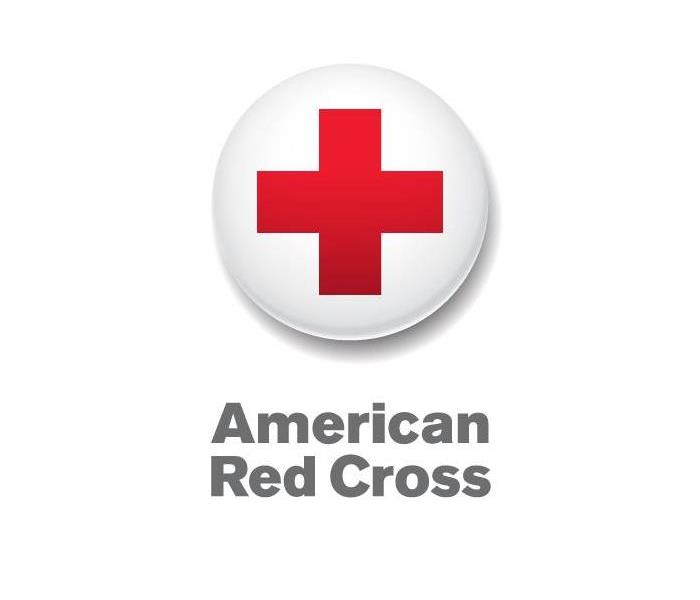 SERVPRO has a partnership with the American Red Cross to help victims of natural disasters.
SERVPRO has a partnership with the American Red Cross to help victims of natural disasters.
No matter where you live, it is important to be informed and prepared for any natural disaster that may occur. Natural disasters often strike without warning, leaving behind a trail of destruction and devastation. Though Mother Nature’s disasters are often unpredictable, there are steps you can take to ensure you are prepared.
SERVPRO has a partnership with the American Red Cross to help victims of natural disasters.
Each year, the American Red Cross recognizes Flood Awareness week in mid-March. The week was designed to promote flood preparedness to home and business owners. Use this time to arm yourself with preparedness tips so you’ll be ready if flooding occurs in your area.
SERVPRO® is proud to partner with the American Red Cross and promote readiness through SERVPRO's Emergency READY Program and the Red Cross's Ready RatingTM program.
Contact SERVPRO® of Lawrence to see how both programs can help better prepare your business for any type of disaster.
6 Tips to Prepare Your Lawrence, Methuen, or Dracut Home
12/16/2016 (Permalink)
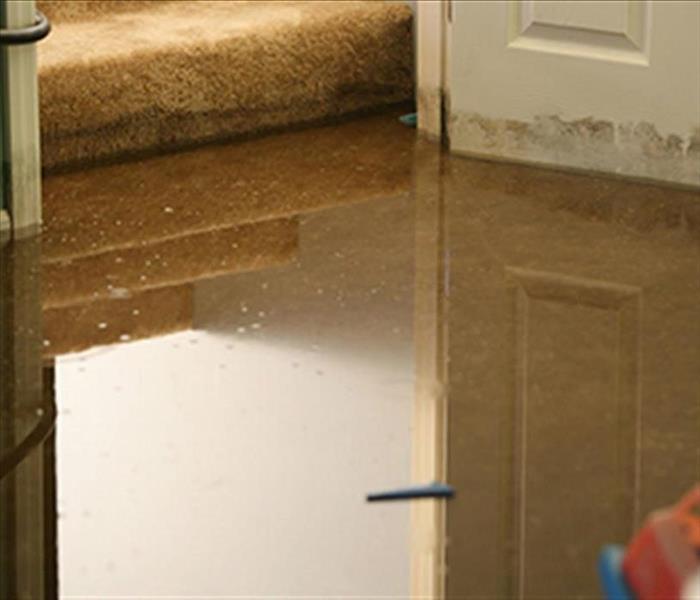 Cold weather can have a huge impact on your home or business if you are not properly prepared.
Cold weather can have a huge impact on your home or business if you are not properly prepared.
Cold weather can have a huge impact on your home or business if you are not properly prepared. Whether it is heavy rain, freezing temperatures, damaging winds, sleet or snow, all can cause serious property damage. While you can't control the weather, you can take steps to be prepared, and help take the sting out of winter weather.
To help prevent costly damages due to weather, consider taking the following precautions before winter weather hits.
- Check your business property for downed tree limbs and Weather, such as wind, heavy rain, ice and snow, can cause branches to fall, which could cause damage to the property and potentially cause personal injuries.
- Roofs, water pipes and gutters should all be inspected to ensure they are in proper order. Gutter downspouts should be directed away from your Clear gutters of debris that may have gathered during the fall. Leaves and other obstructions can lead to a damming effect, causing roof damage and interior water problems.
- Inspect property, especially walkways and parking lots, for proper drainage to alleviate flood hazard
- Inspect all hand rails, stairwells and entryways to address and correct potential slippery or hazardous areas. Install mats or non-slip surfaces and post caution signs where water could be present.
- Protect water pipes from freezing by simply allowing water to drip when temperatures dip below If pipes are under a cabinet, leave the cabinet doors open allowing warm inside air to circulate around the pipes. If the building has outdoor faucets, consider shutting water off at the main valve in the basement or crawl space. Once the valve is off, open the outdoor faucet to ensure it drains, preventing any remaining water from freezing in the pipe
- Ask your local SERVPRO Franchise Professional s about completing an Emergency READY Profile (ERP) for your business The ERP is a no cost assessment to your facility, and provides you with a plan to get back in business fast following a disaster.
Winter Storm Damage in Your Lawrence Area Home
12/16/2016 (Permalink)
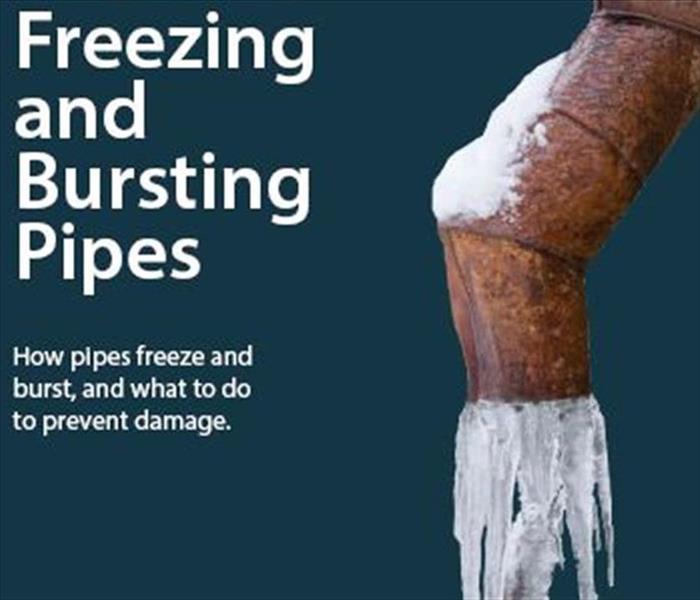 With rain, snow, below freezing temperatures, and ice there are many different causes of damage.
With rain, snow, below freezing temperatures, and ice there are many different causes of damage.
Winter months are very hazardous to homes and businesses. With rain, snow, below freezing temperatures, and ice there are many different causes of damage. While the weather is in Mother Nature’s control, there are steps that everyone can take in order to protect their property.
- Watch for downed limbs and trees. The weight of ice and snow can cause these to break and fall, causing damage to electrical lines or homes. If it does take down wires, stay away from them and call 911 or your electrical company. Do not touch anything that the wires are on. You never know if they are live.
- Inspect the roof, gutters, and water pipes for damage. Keep them clear of all debris.
- Keep roof lines clear of snow and ice as much as possible to prevent ice dams
- When temperatures dip below freezing, keep faucets dripping in order to prevent frozen pipes that can burst and cause further damage.
- If you own a commercial building, consider asking SERVPRO® of Lawrence to provide and Emergency Ready Profile to help prepare you when an emergency does happen. As this is a free program, there is no better time than now to get this started.
These and many more tips will help keep you safe this winter, and hopefully prevent less damage to your property.
Lawrence, Methuen, and Dracut MA 24 Hour Emergency Water Damage Service
8/23/2016 (Permalink)
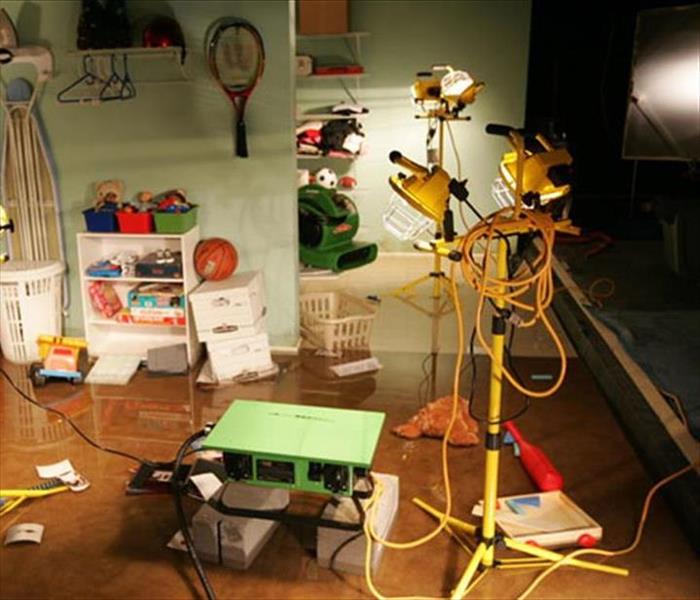 SERVPRO of Lawrence provides 24 hour fire and water damage restoration service in Lawrence, Methuen, and Dracut, MA
SERVPRO of Lawrence provides 24 hour fire and water damage restoration service in Lawrence, Methuen, and Dracut, MA
SERVPRO of Lawrence is available 24 hours a day for water emergencies, large or small. When you are dealing with water damage, immediate action is crucial. A delay of just a few hours can greatly increase the severity of the water damage.
We Answer the Phone Ready to Help
Call Today - 978-688-2242
We understand that when you call us, you may be feeling confused, stressed, and vulnerable. You need an expert to guide you through this crisis. SERVPRO ofLawrence has the specific water damage training and experience to help you through this tough time. We specialize in water damage restoration—in fact, it's the cornerstone of our business.
What to Expect
When you call, we will ask several questions regarding your water damage emergency. These questions will help us determine what equipment and resources to bring, including how many trained SERVPRO Professionals may be needed.
Our SERVPRO Representative will ask several questions:
- Your name and contact information
- Your insurance information (if applicable)
- The street address of the water-damaged home or business
- When did the flooding or water damage occur?
- What caused the water damage (if known)?
- Is there electricity available (on-site)?
About SERVPRO of Lawrence
SERVPRO of Lawrence specializes in the cleanup and restoration of residential and commercial property after a fire, smoke or water damage event. Our staff is highly trained in property damage restoration. From initial and ongoing training at SERVPRO’s corporate training facility to regular IICRC-industry certification, rest assured our staff is equipped with the knowledge to restore your property.
Meet our crew http://www.SERVPROlawrence.com/employee-photos
Certifications http://www.SERVPROlawrence.com/restoration-training-certifications
Summer Storms can Surprise You!
8/8/2016 (Permalink)
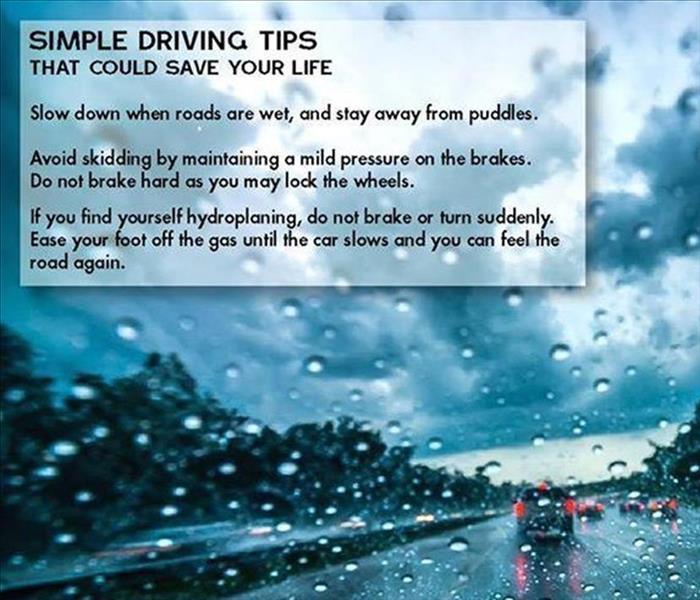 If you get stuck in a storm driving, stay safe, and follow the rules of the road
If you get stuck in a storm driving, stay safe, and follow the rules of the road
Summer storms can be beautiful to watch but also very dangerous to your home and office. In order to stay safe, please follow these and other safety tips for your home.
Before the Storm
- Have an emergency supply kit on hand
- Develop a communication plan with all members of your family
- Unplug electrical equipment
- Secure outdoor objects that could cause damage if they are thrown
- Stay inside a building or hard top vehicle
- Secure windows and doors
During the Storm
- Use a battery operated radio for updates and alerts
- Avoid contact with corded phones
- Avoid contact with electrical equipment
- Avoid contact with water
- Stay away from windows and doors
After the Storm
- Do not touch any downed wires
- Do not drive through a flooded roadway
- Stay away from storm damaged areas
Keep you and your family safe through a storm. When in doubt, stay away from anything that may look suspicious.






 24/7 Emergency Service
24/7 Emergency Service





















